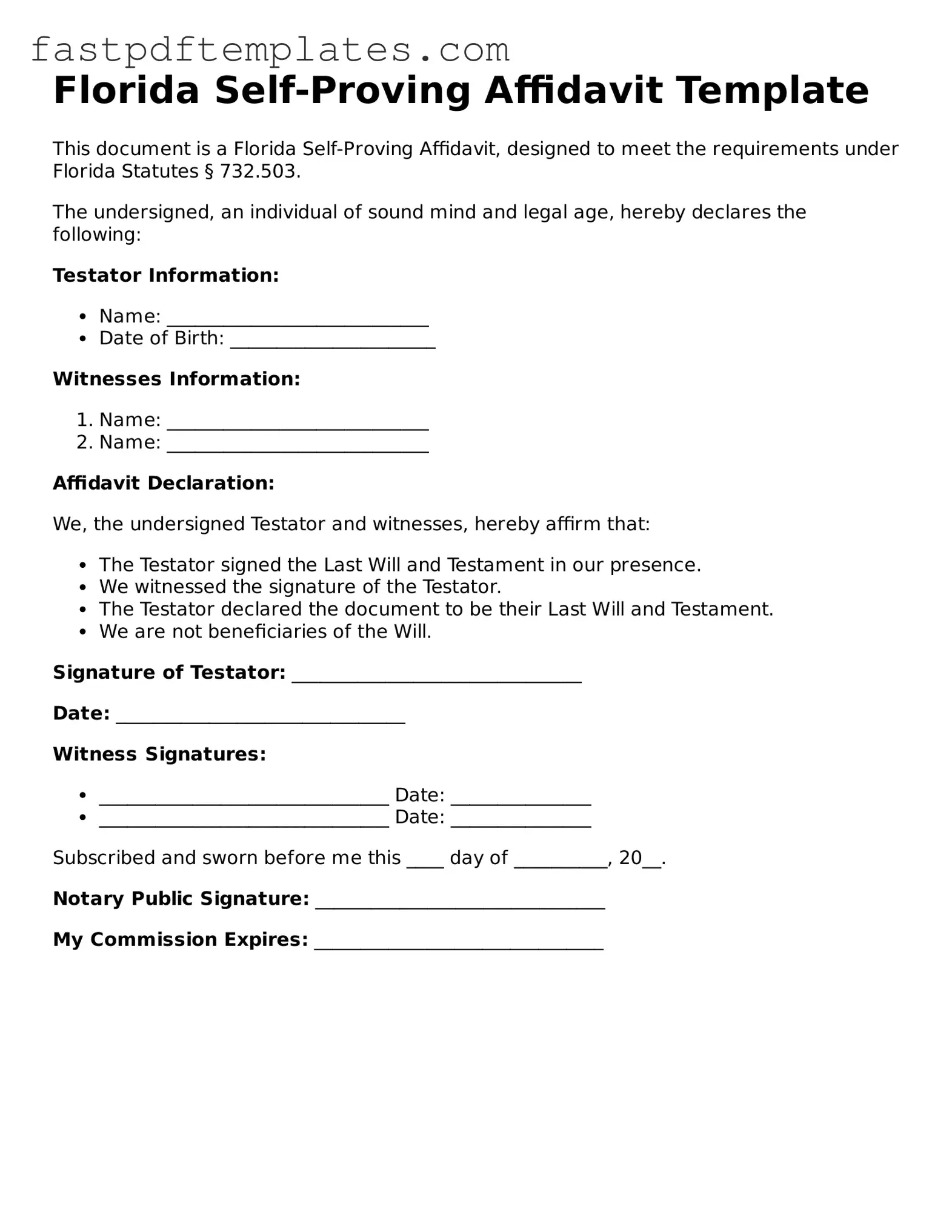The Florida Self-Proving Affidavit is similar to the Last Will and Testament. A Last Will and Testament outlines how a person's assets will be distributed upon their death. It provides clarity and direction for loved ones during a difficult time. Both documents serve to ensure that a person's wishes are honored, but the Self-Proving Affidavit specifically adds a layer of verification. It confirms that the will was signed in the presence of witnesses, which can simplify the probate process and reduce the chances of disputes.
Another document that shares similarities with the Florida Self-Proving Affidavit is the Durable Power of Attorney. This legal document allows an individual to designate someone else to make decisions on their behalf, especially in matters related to finances or health care. Like the Self-Proving Affidavit, the Durable Power of Attorney requires signatures and witnesses to validate its authenticity. Both documents are crucial in ensuring that a person's preferences are respected, even when they are unable to express them directly.
The Health Care Proxy is also akin to the Florida Self-Proving Affidavit. This document allows individuals to appoint someone to make medical decisions for them if they become incapacitated. Similar to the Self-Proving Affidavit, a Health Care Proxy requires witnesses to confirm that the individual granting authority is doing so voluntarily and with a clear understanding of the document's implications. Both documents aim to protect a person’s wishes in sensitive situations.
The Living Will shares characteristics with the Florida Self-Proving Affidavit as well. A Living Will specifies a person's preferences regarding medical treatment in the event they are unable to communicate those wishes. Just like the Self-Proving Affidavit, it often requires signatures and witnesses to ensure that the individual's intentions are clear and legally binding. Both documents are essential for ensuring that a person’s desires regarding their care are honored.
The Revocable Trust is another document that bears resemblance to the Florida Self-Proving Affidavit. A Revocable Trust allows individuals to manage their assets during their lifetime and specify how those assets should be distributed after their death. This document can help avoid probate, similar to how a Self-Proving Affidavit can streamline the probate process for a will. Both documents emphasize the importance of clear intentions and proper documentation to protect a person's legacy.
The Affidavit of Heirship is also similar to the Florida Self-Proving Affidavit. This document is often used to establish the heirs of a deceased person, particularly when there is no will. Like the Self-Proving Affidavit, it requires signatures from witnesses to validate the claims made within it. Both documents serve to clarify ownership and ensure that a person’s wishes regarding their estate are respected, even in the absence of a formal will.
The Certificate of Trust is another document that aligns with the Florida Self-Proving Affidavit. This certificate provides evidence of the existence of a trust and outlines its key terms. While the Self-Proving Affidavit verifies the authenticity of a will, the Certificate of Trust confirms the validity of a trust arrangement. Both documents are instrumental in ensuring that an individual’s estate planning intentions are honored and upheld.
Lastly, the Quitclaim Deed shares similarities with the Florida Self-Proving Affidavit. A Quitclaim Deed is used to transfer ownership of property from one person to another without guaranteeing that the title is free from claims. Like the Self-Proving Affidavit, it often requires signatures and witnesses to validate the transfer. Both documents play a vital role in estate planning and property management, ensuring that the intentions of the parties involved are clearly documented and legally recognized.

